Along London' River
Page 56
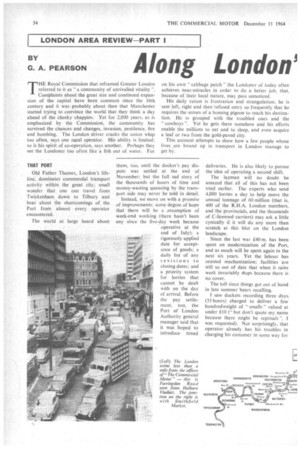
Page 57
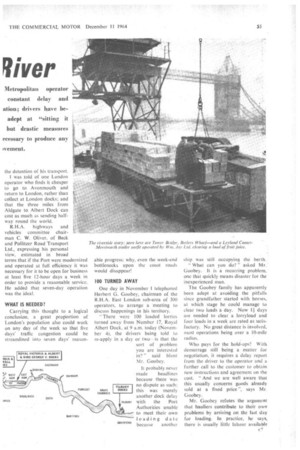
Page 58
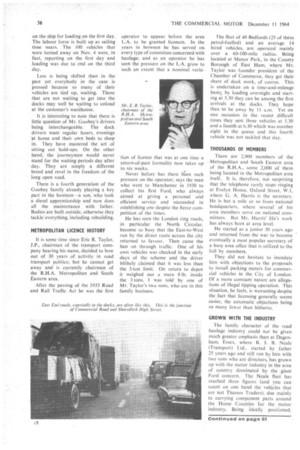
Page 63
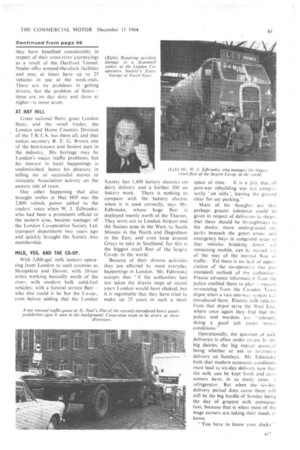
Page 64
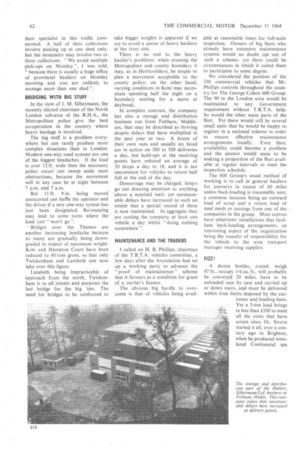
Page 65
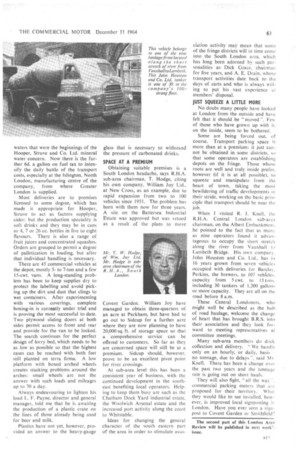
If you've noticed an error in this article please click here to report it so we can fix it.
Metropolitan operator constant delay and ation; drivers have beadept at "sitting it but drastic measures ecessary to produce any
BY G. A. PEARSON
THE Royal Commission that reframed Greater London referred to it as "a community of unrivalled vitality ". ComPlaints about the great size and continued expansion of the capital have been common since the 16th century and it was probably about then that Manchester started trying to convince the world that they think a day ahead of the cheeky chappies. Yet for 2,000 years, as is emphasized by the Commission, the community has survived the chances and changes, invasion, pestilence, fire arid bombing. The London driver cracks the union whip too often, says one rural operator. His ability is limited: so is his spirit of co-operation, says another. Perhaps they see the Londoner too often like a fish out of water. For
on his own "cabbage patch" the Londoner of today often achieves near-miracles in order to do a better job, that, because of their local nature, may pass unnoticed.
His daily ration is frustration and strangulation; he is sent left, right and then-refused entry so frequently that he requires the senses of a homing pigeon to reach his destination. He Is grouped with the troubled ones and the "cowboys ". Yet he gets there somehow and his efforts enable the millions to eat and to sleep, and even acquire a leaf or two from the gold-paved city.
This account attempts to show how a few people whose lives are bound up in transport in London manage to get by.
THAT PORT
Old Father Thames, London's lifeline-, dominates commercial transport activity within the great city; small wonder that one can travel from Twickenham down to Tilbury and hear about the shortcomings of the Port from almost every operator encountered.
them, too, until the docker's pay dispute was settled at the end of November; but the full sad story of the thousands of hours of time and money-wasting queueing by the transport side may never be told in detail.
Instead, we move on with a promise of improvements; some degree of hope that there will be a resumption of week-end working (there hasn't been any since the five-day week became operative at the end of July); a rigorously applied date for acceptance of goods; a daily list of any revisions to closing dates; and a priority system for lorries that cannot be dealt with on the day of arrival. Before the pay settlement, too, the Port of London Authority general manager said that it was hoped to introduce timed deliveries. He is also likely to pursue the idea of operating a second shift.
The layman will no doubt be amazed that all of this has not been tried earlier. The experts who send 4,000 lorries a day to help move the annual tonnage of 60 million (that is, 400 of the R.H.A. London members, and the provincials, and the thousands of C-licensed carriers) may ask a little cynically if it will do any more than scratch at this blot on the London landscape.
Since the last war £40 m. has been spent on modernization of the Port, and as much will be spent again in the next six years. Yet the labour has resisted mechanization; facilities are still so out of date that when it rains work invariably stops because there is no cover.
The toll since things got out of hand in late summer bears recalling.
saw dockets recording three days, (33 hours) charged to deliver a few hundredweight of "smalls" valued at under £10 (" but don't quote my name because there might be reprisals ", I was requested). Not surprisingly, that operator already has his troubles in charging his customer in some way for the detention of his transport.
1 was told of one London operator who finds it cheaper to go to Avonmouth and return to London, rather than collect at London docks; and that the three miles from Aldgate to Albert Dock Can cost as much as sending halfway round the world.
R.H.A. highways and vehicles committee chairman C. W. Oliver, of Beck and PoHazer Road Transport Ltd., expressing his personal view, estimated in broad terms that if the Port were modernized and operated at full efficiency it was necessary for it to be open for business at least five 12-hour days a week in order to provide a reasonable service. He added that seven-day operation was the ideal.
WHAT IS NEEDED?
Carrying this thought to a logical conclusion, a great prop-ortion of London's population also could work on any day of the week so that five days' traffic congestion could be streamlined into seven days' reason
able progress: why, even the week-end bottlenecks upon the coast roads would disappear!
100 TURNED AWAY One day in November I telephoned Herbert G. Goobey, chairman of the R.H.A. East London sub-area of 300 operators, to arrange a meeting to discuss happenings in his territory. There were 100 loaded lorries turned away from Number 17, Royal Albert Dock, at 9 a.m. today (November 4), the drivers being told to re-apply in a day or two —is that the sort of problem you are interested in? " said blunt Mr. Goobey.
It probably never made headlines because there was
TILBURY 1
DOCKS no dispute as such; this was merely 1r TILBURY another dock delay
with the Port Authorities unable to meet their own loading date because another ship was still occupying the berth.
What can you do?" asked Mr. Cioobey. It is a recurring problem, one that quickly means disaster for the inexperienced man.
The Goobey family has apparently been adept at avoiding the pitfalls since grandfather started with horses, at which stage he could manage to clear two loads a day. Now 14 days are needed to clear a lorryload and four loads in a week are rated as satisfactory. No great distance is involved, most operations being over a 10-mile radius.
Who pays for the hold-ups? With demurrage still being a matter for negotiation, it requires a delay report from the driver to the operator and a further call to the customer to obtain new instructions and agreement on the cost. "And we are well aware that this usually concerns goods already sold at a fixed price", says Mr. G oobey.
Mr. Goobey refutes the argument that hauliers contribute to their own problems by arriving on the last day for loading. In practice, he says., there is usually little labour available on the ship for loading on the first day. The labour force is built up as sailing time nears. The 100 vehicles that were turned away on Nov. 4 were, in fact, reporting on the first day and loading was due to end on the third day.
Less is being shifted than in the past yet everybody in the case is pressed because so many of their vehicles are tied up, waiting. Those that are not waiting to get into the docks may well be waiting to unload at the customer's warehouse.
It is interesting to note that there is little question of Mr. Goobey's drivers being interchangeable. The dock drivers want regular hours, evenings at home and their own beds to sleep in. They have mastered the art of sitting out hold-ups. On the other hand, the journeymen would never stand for the waiting periods day after day. They are simply a different breed and revel in the freedom of the long open road.
There is a fourth generation of the Goobey family already playing a key part in the business—a son, who took a diesel apprenticeship and now does all the maintenance with father. Bodies are built outside, otherwise they tackle everything, including rebuilding.
METROPOLITAN LICENCE HISTORY It is some time since Eric R. Taylor, J.P., chairman of the transport company bearing his name, decided to bow out of 30 years of activity in road transport politics; but he cannot get away and is currently chairman of the R.H.A. Metropolitan and South Eastern area.
After the passing of the 1933 Road and Rail Traffic Act he was the first operator to appear before the area L.A. to be granted licences. In the years in between he has served on every type of committee concerned with haulage; and as an operator he has seen the pressure on the L.A. grow to such an extent that a nominal varia tion of licence that was at one time a return-of-post formality now takes up to six weeks.
Never before has there been such pressure on the operator, says the man who went to Manchester in 1930 to collect his first Ford, who always aimed at giving a personal and efficient service and succeeded in establishing one despite the fierce competition of the times.
He has seen the London ring roads, in particular the North Circular, become so busy that the East-to-West run by the direct route across the city returned to favour. Then came the ban on through traffic. One of his own vehicles was checked in the early days of the scheme and the driver blithely claimed that it was less than the 3-ton limit. On return to depot it weighed out a mere 8 lb. inside the 3 tons. I was told by one of Mr. Taylor's two sons, who are in this family business.
The fleet of 40 Bedfords (25 of them petrol-fuelled) and an average 14 hired vehicles, are operated mainly over a 60-100-mile radius. Being located at Manor Park, in the County Borough of East Ham, where Mr. Tayleir was founder president of the Chamber of Commerce, they get their share of dock work, of course. This is undertaken on a time-and-mileage basis; by loading overnight and starting at 5.30 they can be among the first arrivals at the docks. They hope then to be away by 11 a.m. Yet on one occasion in the recent difficult times they sent three vehicles at 5.30 and a fourth at 6.30 which was number eight in the queue and this fourth vehicle was not tackled that day.
THOUSANDS OF MEMBERS
There are 2,900 members of the Metropolitan and South Eastern area of the R.H.A., some 2,000 of them being located in the Metropolitan area itself. It is, therefore, not surprising that the telephone rarely stops ringing at Evelyn House, Oxford Street, W.1, where G. A. Harris is the secretary. He is but a mile or so from national headquarters, where several of his area members serve on national cornmittees. But Mr. Harris' life's work has always been at area level.
He started as a junior 30 years ago and returned from the war to become eventually a most popular secretary of a busy area office that is utilized to the full by members.
They did not hesitate to inundate him with objections to the proposals to install parking meter's for commercial vehicles in the City of London. Of a more constant nature are allegations of illegal tipping operation. This situation, he feels, is worsening despite the fact that licensing generally seems easier, the automatic objections being so many fewer than hitherto.
GROWN WITH THE INDUSTRY
The family character of the road haulage industry could not be given much greater emphasis than at Dagenham. Essex, where R. J. B. Neale (Transport) Ltd., started by father 25 years ago and still run by him with two sons who are directors, has grown up with the motor industry in the area of country dominated by the giant Ford concern. The Neale fleet has reached three figures (and you can count on one hand the vehicles that are not Thames Traders), due mainly to carrying component parts around the Home Counties for the motor industry. Being ideally positioned, they have benefited considerably in respect of their cross-river journeyings as a result of the Dartford Tunnel. Neales offer around-the-clock facilities and may at times have up to 25 vehicles in use at the week-ends. There are no problems in getting drivers, but the problem of fitters— three are on day duty and three at nights—is more acute.
AT HAY HILL
Great national fleets; great London fleets; and the small trader; the London and Home Counties Division
° of the T.R.T.A. has them all, and that makes secretary R. E. G. Brown one of the best-known -and busiest men in the industry. His heritage may • be London's major traffic problems, but his interest in local happenings is undiminished, hence his pleasure in telling me of successful moves to stimulate Association activity on the eastern side of town.
One other happening that also brought smiles at Hay Hill was the 2,800 vehicle power added to the traders' voice when W. J. Edbrooke, who had been a prominent official in the eastern area, became manager of the London Co-operative Society Ltd. transport department two years ago and quickly brought the Society into membership.
MILK, VEG. AND THE CO-OP.
With 3,000-gal. milk tankers operating from London to such counties as Shropshire and Devon; with 10-ton artics working basically north of the river: with modern bulk solid-fuel vehicles; with a funeral service fleet— who else could it be but the Co-op., even before adding that the London Society has 1,400 battery electrics on dairy delivery and a further 300 on bakery work. There is nothing to compare with the battery electric when it is used correctly, says Mr. Edbraoke, whose huge fleet is deployed mainly north of the Thames. They serve out to London Airport and the Staines area in the West, to South Mimms in the North and Dagenham in the East, and even loop around Grays to take in Southend, for this is the biggest retail fleet of the largest Co-op. in the world.
. Because of their diverse activities they are affected by most everyday happenings in London. Mr. Edbrooke accepts that " if the authorities had not taken the drastic steps of recent years London would have choked, but it is regrettable that they have tried to make up 25 years in such a short
space of time. It is a pity that al!
post-War :rebuilding was not
'on stilts ', leaving the ground clear for car parking."
More of his thoughts are that perhaps greater tolerance could kw given in respect of deliveries to shops: that there should be throughways to the docks; more underground car parks beneath the green areas: and emergency bays in congested areas so that vehicles breaking down. yet remaining mobile, can be moved of the way of the normal Howoi traffic. Yet there is no lak of appre ciation of the co-operatk e (no pito intended) outlook of the authoriiie,. Precise advance informati,,-.n Crom the
police enabled them to plan smooth
re-routeing from the Camden Town depot when a vast one-way system vs as
introduced there. Electric milk vehicles
from that depot serve the West End. where once again they find that the police and wardens are -*tolerant. doing a good job under severe conditions."
Operationally, the question of milk deliveries is often under res,iew by the big dairies, the big topi,:al question being whether or not to delermire .delivery on Sundays. Mr. Edbrooke feels that modern economic conditions must lead to six-day delivery now that
the milk can be kept fresh and corsumers have, in 5o many cases, a
refrigerator. But when the six-daN, delivery period does come there will still be the big hurdle of Sunday being
the day of greatest milk consumption, because that is when most of the wage earners are taking their meals at home.
their specialist in this traffic commented. A half of their collections involve picking up at one shed only, but the remainder may involve two or three collections. " We avoid multiple pick-ups on Monday ", I was told, "because there is usually a huge influx of provincial hauliers on Monday morning and you are unlikely to manage more than one shed ".
BRIDGING WITH BIG STUFF
In the view of J. M. Silbermann, the recently elected chairman of the North London sub-area of the R.H.A., the Metropolitan police give the best co-operation in the country where heavy haulage is involved.
The big stuff is a problem everywhere but can rarely produce more complex situations than in London. Modern one-way road systems are one of the biggest headaches. If the load is over 12 ft. wide then the necessary police escort can sweep aside most obstructions, because the movement will in any ease be at night between 7 p.m. and 7 a.m.
But 11 ft. 9 in. being moved unescorted can baffle the operator and the driver if a new one-way system has just been designated. Re-routeing may lead to some turns where the load just "won't go ".
' Bridges over the Thames are another increasing headache because so many are gradually being downgraded in respect of maximum weight. Kew and Hampton Court have been reduced to 40 tons gross, so that only Twickenham and Lambeth can now take over this figure.
Lambeth being impracticable of approach from the north, Twickenham is to all intents and purposes the last bridge for the big 'uns. The need for bridges to be reinforced to take bigger weights is apparent if we are to avoid a queue of heavy hauliers at the river side.
There is no end to the heavy haulier's problems; when crossing the Metropolitan and county boundary it may, as in Hertfordshire, be simple to plan a movement acceptable to the county police; on the other hand, varying conditions in Kent may necessitate spending half the night on a boundary waiting for a move at daybreak.
In complete contrast, the company has also a storage and distribution business run from Feltham, Middlesex, that may be described as thriving despite delays that have multiplied in the past year or two. A dozen of their own vans and usually six hired are in action on 300 to 500 deliveries a day, but hold-ups at the receiving points have reduced an average of 30 drops a day to 18, and it is not uncommon for vehicles to return half full at the end of the day.
Demurrage may be charged; letters go out drawing attention to anything above a nominal wait; yet unreasonable delays have increased to such an extent that a special record of these is now maintained. in aggregate they are costing the company at least one vehicle a day whilst "doing nothing somewhere ".
MAINTENANCE AND THE TRADERS
, I called on H. B. Phillips, chairman of the T.R.T.A. vehicles committee, a few days after the Association had set up a working party to advance the " proof of maintainence " scheme that it favours as a condition for grant of a carrier's licence.
The obvious big hurdle to overcome is that of vehicles being avail
able at reasonable times for full-scale inspection. Owners of big fleets who already have extensive maintenance systems would no doubt opt out of such a scheme; yet there could be circumstances in which it suited them to participate to some degree.
We considered the position of the 330 commercial vehicles that Mr. Phillips controls throughout the country for The George Cohen 600 Group. The 90 in the London area would be maintained to any Government requirement without T.R.T.A. help. So would the other main parts of the fleet. Yet there would still be several small units that he would be happy to register in a national scheme in order to ensure effective maintenance arrangements locally. Even then, availability could become a problem and the answer would seem to be making a proportion of the fleet available at regular intervals to meet the inspection schedule.
The 600 Group's usual method of working is to call in general hauliers for journeys in excess of 60 miles unless back-loading is reasonably sure, a common instance being an outward load of scrap and a return load of steel mesh or castings from one of the companies in the group. Most centres have teleprinter installations that facilitate back-loading arrangements, an interesting aspect of the organization being the transfer of responsibility for the vehicle to the area transport manager receiving supplies.
FIZZ!
A dozen bottles, crated, weigh 47 lb., occupy 1.6 Cu. ft., will probably be conveyed 20 miles, have to be unloaded case by case and carried up or down stairs, and must be delivered within time limits imposed by the customer and loading bans. Yet a 5-ton load brings in less than £100 to meet all the costs that have arisen since Dr. Struve started it all, over a century ago in Brighton, when he produced simulated Continental spa waters that were the beginnings of the Hooper, Struve and Co, Ltd. mineral water concern. Now there is the further 6d. a gallon on fuel tax to intensify the daily battle of the transport costs, especially at the Islington, North London, manufacturing centre of the company, from where Greater London is supplied.
Most deliveries are to premises licensed to some degree, which has made it appropriate for Hooper, Struve to act as factors supplying cider; but the production speciality is soft drinks and they may be in cans or 4, 7 or 26 oz. bottles in five to eight flavours. There is also a range of fruit juices and concentrated squashes. Orders are grouped to permit a degree of palletization in loading, but after that individual handling is necessary.
There are 45 commercial vehicles at the depot, mostly 5to 7-ton and a few 15-cwt. vans. A long-standing problem has been to keep supplies dry to protect the labelling and avoid picking up the dirt and dust that clings to wet containers. After experimenting with various coverings, complete boxing-in is currently under trial and is proving the most successful to date. Two plywood sliding doors at both sides permit access to front and rear and provide for the van to be locked. The search continues for the perfect design of lorry bed, which needs to be as low as possible so that the highest cases can be reached with both feet still planted on terra firma, A low platform with boxed arched wheels creates stacking problems around the arches: small wheels are not the answer with such loads and mileages up to 70 a day.
Always endeavouring to lighten his load L. F. Payne, director and general manager, told me that he is awaiting the production of a plastic crate on the lines of those already being used for beer and milk.
Plastics have not yet, however, provided an answer to the heavy-gauge glass that is necessary to withstand the pressure of carbonated drinks.
SPACE AT A PREMIUM Obtaining suitable premises is a South London headache, says R.H.A. sub-area chairman, T. Hodge, citing his own company, William Joy Ltd.. at New Cross, as an example, due to rapid expansion from two to 100 vehicles since 1951. The problem has been with them now for three years. A site on the Battersea Industrial Estate was approved but was vetoed as a result of the plans to move Covent Garden. William Joy have managed to obtain three-quarters of an acre at Peckham, but have had to go out to Sidcup for a further acre where they are now planning to have 20,000 sq. ft. of storage space so that a comprehensive service can be offered to customers. So far as they are concerned space will still be at a premium. Sidcup should, however, prove to be an excellent pivot point for river crossings.
At sub-area level this has been a consistent year of business, with the continued development in the southeast benefiting local operators. Helping to keep them busy are such as the Chatham Dock Yard industrial estate, the Woolwich Arsenal estate and the increased port activity along the coast to Whitstable.
Ideas for changing the general character of the south eastern part of the area in order to stimulate asso
elation activity may mean that some of the fringe districts will in lime come into the South London area, which has long been adorned by such personalities as Dick Grace. chairman for five years, and A. E. Drain, whose transport activities date back to the days of carts and who is always willing to put his vast experience at members' disposal.
JUST SQUEEZE A LITTLE MORE No doubt many people have looked at London from the outside and have felt that it should be "moved ". Few of those who have grown up with it, on the inside, seem to be bothered.
Some are being forced out, of course. Transport parking space is more than at a premium; it just can. not be obtained in some districts, so that some operators are establishing depots on the fringe. Those whose roots are well and truly inside prefer, however (if it is at all possible), to squeeze and manipulate from the heart of town, taking the most bewildering of traffic developments in their stride, working on the basic principle that transport should be near the job.
When I visited R. J. Knell, the R.H.A; Central London sub-area chairman, on the Albert Embankment, he pointed to the fact that as man as nine operators found it advantageous to occupy the short stretch along the river from Vauxhall to Lambeth Bridge. His own company John Houston and Co. Ltd.. has in 16 years grown from seven vehicles occupied with deliveries for Barclay, Perkins, the brewers, to 107 vehreles, capacity from 5 cwt. to 15 tons, including 30 tankers of 1.200 gallon, or more capacity. They are all on the road before 8 a.m.
These Central Londoners. who might well be described as the hub of road haulage, welcome the change of heart that has brought B.R.S. into their association and they look forward to meeting representatives at committee meetings.
Many sub-area members do dock
collection and delivery. We handle only on an hourly, or daily, basis no tonnage, due to delays ", said Mr. Knell, There has been a change evel the past two years and the tonnage rate is going out on short hauls.
They will also fight, "all the way commercial parking meters that are proposed for their territory. What they would like to see installed, however, is improved local signposting ir London. Have you ever seen a signpost to Covent Garden or Smithfield?
The second part of this London Area Review will be published in next week'l issue.
















































































































